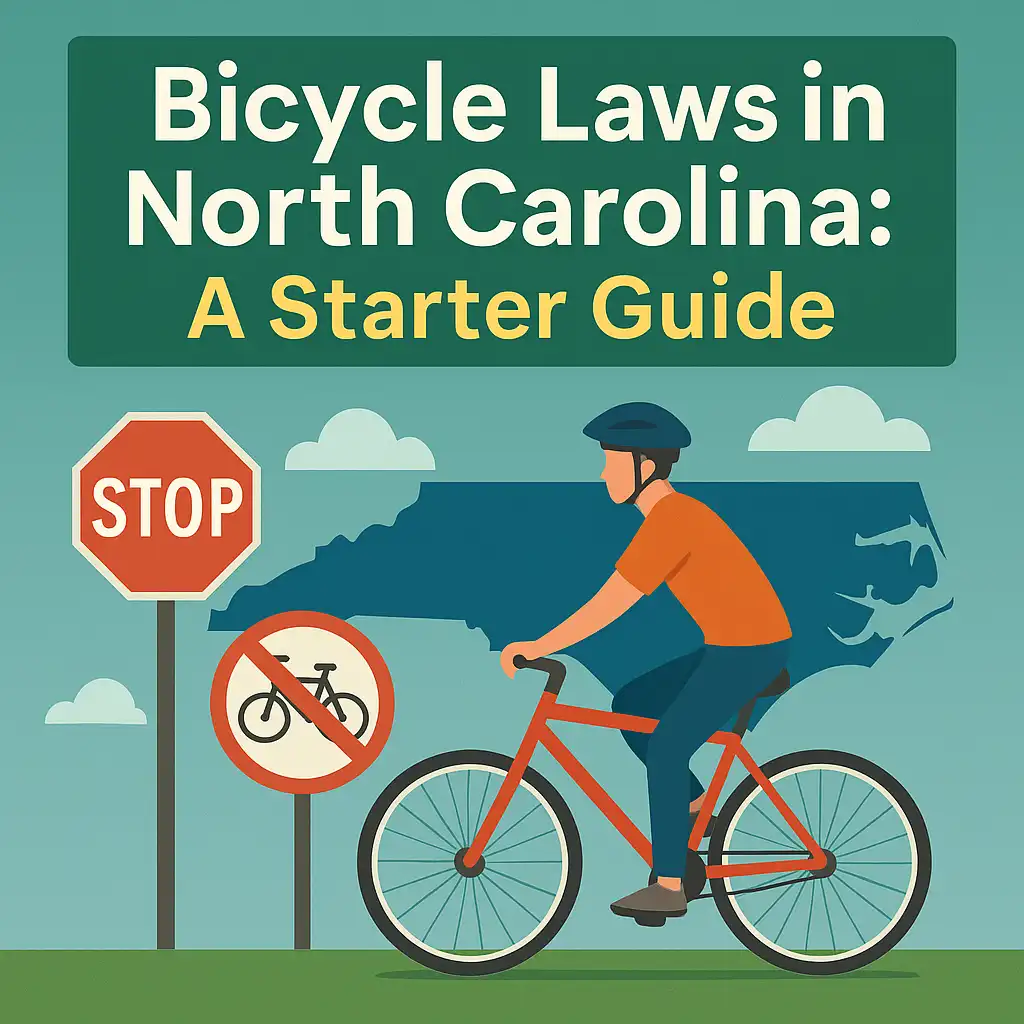Available 24/7
Se Habla Español
Free Case Evaluation
Evaluación gratuita de caso
(919) 438-0065

Cycling in North Carolina offers numerous benefits, from health and environmental advantages to cost savings. However, understanding the state's bicycle laws is crucial for safety and legal compliance. Whether you're commuting in Raleigh, exploring trails in Cary, or riding through Clayton, this guide provides an overview of the key regulations every cyclist should know in 2025.
In North Carolina, bicycles are legally recognized as vehicles. This classification means that cyclists have the same rights and responsibilities as motorists when operating on public roads. Cyclists must adhere to traffic signals, signs, and general road rules, including yielding when appropriate and signaling turns. This legal status underscores the importance of predictable and lawful riding behavior to ensure safety for all road users.
North Carolina law mandates that all cyclists under the age of 16 wear a properly fitted and fastened helmet when riding on public roads, paths, or rights-of-way. This requirement aims to protect younger riders from head injuries in the event of a crash. While adults are not legally required to wear helmets, it is strongly recommended for safety. Parents or guardians can be held responsible if a child under their care is found riding without a helmet, potentially facing fines or other penalties.
The legality of riding bicycles on sidewalks in North Carolina varies by municipality, as there is no statewide law addressing this issue. In some cities, such as Raleigh, local ordinances prohibit sidewalk cycling in certain areas, particularly in business districts. Cyclists should consult local regulations to determine where sidewalk riding is permitted. When riding on sidewalks where allowed, cyclists must yield to pedestrians and exercise caution to prevent accidents.
E-bikes are permitted on roadways, bike lanes, and shared-use paths unless restricted by local ordinances. Riders should verify local regulations, as municipalities have the authority to impose additional rules regarding e-bike usage.
To enhance visibility and safety during nighttime riding, North Carolina law requires bicycles to be equipped with specific lighting and reflectors:
These requirements are crucial for preventing accidents and ensuring that cyclists are seen by other road users in low-light conditions.
Motorists in North Carolina are required to exercise caution when overtaking cyclists. Drivers must provide a minimum of two feet of clearance when passing a bicycle and may cross the center line if necessary and safe to do so. This law aims to protect cyclists from potential collisions and emphasizes the shared responsibility of all road users to maintain safety.
Violations of bicycle-related laws in North Carolina can result in various penalties:
Understanding and adhering to these laws is essential for the safety of all road users and helps prevent legal consequences.
If you're involved in a bicycle accident in North Carolina, it's important to take the following steps:
At Paul Robinson Law, P.L.L.C., we specialize in personal injury cases, including bicycle accidents. Our team is dedicated to helping clients in Raleigh, Cary, Clayton, and throughout North Carolina navigate the complexities of personal injury claims. Contact us for a free consultation to discuss your case and explore your legal options.
For riders under 16, yes. North Carolina law requires cyclists under the age of 16 to wear a properly fitted helmet. While adults are not legally required to wear helmets, it is strongly recommended for safety.
It depends on local ordinances. There is no statewide law prohibiting sidewalk cycling, but many municipalities have specific regulations. Always check local laws before riding on sidewalks.
Yes, electric bikes are legal on North Carolina streets, provided they meet the state's classification criteria and comply with local regulations. Class 3 e-bike riders must be at least 16 years old and wear helmets.
Penalties vary based on the circumstances. Drivers may face fines, license points, or more severe legal consequences if found at fault in a collision with a cyclist. It's crucial to consult with a legal professional to understand the specific implications.
Navigating the aftermath of a bicycle accident can be overwhelming. At Paul Robinson Law, P.L.L.C., we are committed to providing compassionate and effective legal representation to injury victims across North Carolina. Our experienced team is here to help you understand your rights and pursue the compensation you deserve. Contact us today for a free consultation.
Call Us At
919-438-0065
105 S Ellington St, Clayton, NC 27520
124 St Marys St Ste 201, Raleigh, NC 27605
800 W Williams St #250 Apex, NC 27502
Clayton Office:
Phone : 919-438-0065
Raleigh Office:
Phone : 919-471-3200
Apex Office:
Phone : (919) 944-4630
105 S Ellington St, Clayton, NC 27520
124 St Marys St Ste 201, Raleigh, NC 27605
800 W Williams St #250 Apex, NC 27502
Copyright @2026 The Law Offices Of Paul Robinson. All Rights Reserved.
This site is for information purposes only. No attorney-client relationship is created by use of this site. No legal advice is intended by its use. An attorney-client relationship is only created speaking to an attorney and signing a representation agreement.
By providing your phone number, you agree to receive text messages from Paul Robinson Law, PLLC. Message and data rates may apply. Message frequency varies.

